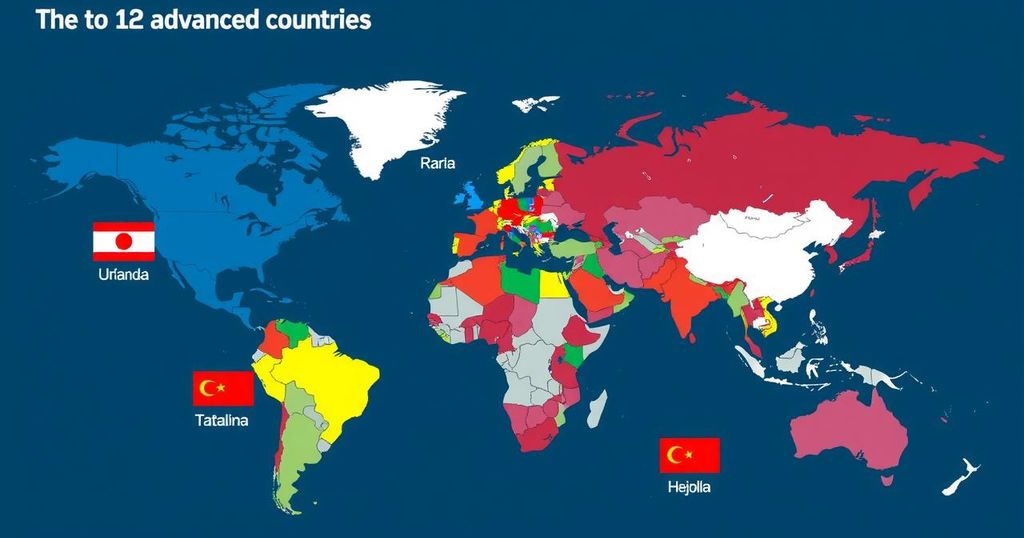In 2024, South Korea, the United States, and Denmark lead as the most advanced countries due to their significant contributions to technology, innovation, and research. Each country excels in various technological sectors, with a strong emphasis on education and collaboration, paving the way for global advancements that enhance societal progress.
The world of 2024 is characterized by remarkable advancements in technology, driven by the achievements of twelve countries noted for their exceptional contributions. Topping the list is South Korea, followed closely by the United States and Denmark. These countries excel in internet usage, innovation, and research and development capabilities. Their commitment to these spheres not only enhances their global standing but also fosters international collaboration essential for the progression of modern technology. Each nation has cultivated a unique strength that contributes to its ranking on the global stage, leading to breakthroughs that shape the future.
South Korea distinguishes itself through its suffusion of technology in daily life, spearheaded by major corporations such as Samsung and LG. Its strong emphasis on education and research results in an exceptionally tech-savvy population, which fosters an ecosystem ripe for innovation. The government’s vigorous investment in research and development solidifies South Korea’s position as a technological leader.
The United States, historically recognized as an epicenter for scientific advancement, maintains its influence through prestigious educational institutions like MIT and Stanford. The significant allocation of 3.46% of its GDP to research and development catalyzes innovations that span multiple industries. Key achievements from the United States include transformative projects, such as the Mars Rover missions and groundbreaking developments in genetic research.
Denmark benefits from a collaborative approach that fosters an environment conducive to technological advancements, particularly in green energy. Its success is attributed to both its strong educational framework and governmental support for sustainable initiatives, exemplified by the leadership of Vestas in wind energy technologies.
Switzerland thrives on a solid tradition of education and innovation, hosting world-renowned research institutions like ETH Zurich. Its political neutrality attracts international corporations, enabling substantive advancements in various technological fields, demonstrated through initiatives such as the Large Hadron Collider and advancements in nanotechnology.
Israel’s proactive culture and adaptive nature drive its technological endeavors, particularly in defense and agriculture. A focus on cybersecurity and innovative agricultural practices has positioned it as a significant player in the tech market, supported by a robust government framework for encouragement and funding of startups.
Finland’s approach to education empowers a skilled workforce that excels in telecommunications and clean energy sectors. The Finnish concept of “sisu” underlines a national ethos of resilience and innovation, propelling citizens toward embracing technological evolution.
The Netherlands showcases its strengths through a blend of creativity and historical trading connections, leading to successful companies like ASML and Philips that have significantly contributed to advancements worldwide. Its educational investments prime the next generation for success in high-tech industries.
Sweden’s emphasis on sustainable technology aligns with a culture of collaboration, yielding internationally recognized companies such as Spotify. Its comprehensive digital infrastructure and commitment to innovation have positioned it as a forward-thinking leader.
Norway is recognized for its investments in renewable energy initiatives, prominently featuring hydropower. The country’s ingenuity in shipping and marine technologies reflects a longstanding tradition of adaptation and innovation amidst geographical challenges.
Singapore has cultivated a technologically advanced society through strategic investments and a strong education system focused on STEM fields. Its government actively promotes research and development, leading to advancements in biotechnology and artificial intelligence.
The United Kingdom continues to innovate with companies like AstraZeneca and Rolls-Royce leading the charge in biotechnology and aerospace, respectively. The effective integration of advanced technologies signifies its ongoing commitment to remaining at the forefront.
Belgium strives to enhance its technological reputation through investments in critical areas like cybersecurity and robotics. With a focus on industrial development and innovative startups, the country’s future remains promising as it harnesses renewable energy and advancements in cloud computing.
Ultimately, the achievements of these twelve nations serve as a testament to the power of commitment to innovation, scientific advancement, and international collaboration. Their efforts not only improve their own economies but also contribute to the global tapestry of technology, emphasizing that progress is a universally shared endeavor.
As of 2024, technological advancement remains pivotal in addressing global challenges and fostering economic growth. Countries are increasingly judged by their abilities to innovate, establish robust internet infrastructures, and invest in research and development. This ranking reflects a collective realization that sharing knowledge, harnessing skills, and pursuing sustainability are essential for international progress. The analysis provided draws from various metrics such as GDP spending on research and development, internet and LTE user percentages, and innovation capacities, all crucial indicators of a country’s technological prowess.
In conclusion, the ranking of the twelve most advanced countries in the world illustrates a spectrum of innovation and technological achievement. Each nation’s unique contributions reflect its commitment to advancing society through research, education, and international collaboration. By fostering a culture of knowledge sharing and sustainable practices, these countries position themselves as leaders in global technology, demonstrating that their successes are interconnected and contribute to a collective future.
Original Source: www.worldatlas.com






